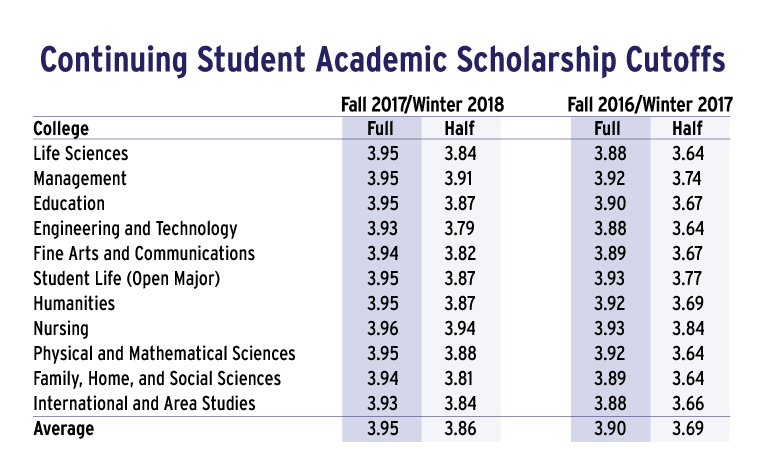
The required GPA for BYU academic scholarships increased since 2016, surprising even Financial Aid Director Steve Hill.
“We don’t set cutoffs in advance,” Hill said.
GPA cutoffs for full- and half-tuition scholarships change every year and vary between each college.
The financial aid office ranks students by their GPAs and then separates them by college in order to ensure students are being compared to students graded on similar standards, according to Hill.
“We take the amount of money that is available and we divide it among the colleges based on their census numbers,” Hill said.
Hill said one reason the cutoffs increased is because approximately 2,000 more students applied for the scholarship than in 2016.
“From our perspective that was a good thing because we want students to apply,” Hill said.
Hill said the financial aid office also found the GPAs in the colleges were higher than the year before.
One college awarded 420 full-tuition and 646 half-tuition academic scholarships last year. If the 2016 cutoffs were applied this year, that college would award 548 full-tuition and 772 half-tuition scholarships, according to Hill.
The GPA also increased because the incoming freshmen had higher credentials than ever before, according to Hill.
Human resource management major Tanner Coombs said this was unfair.
“There has got to be a way to weight the GPAs in a way that values the time and effort that upperclassmen have put in over the years above easier high school classes,” Coombs said.
Hill said another reason the GPA cutoffs increased is because fewer students are graduating than anticipated.
“What that does is it creates a little bit of a log jam, and so students that have high GPAs that stay an extra semester, they receive another scholarship and that prevents another student maybe from receiving it,” Hill said.
Another reason for the surge is the continuing effect of the LDS missionary age change.
Hill said the LDS missionary age change has been a very difficult thing to work out, despite being thrilled by President Monson’s announcement.
“In the press conference afterward, Elder (Jeffrey R.) Holland said ‘We know that there will be some impact on BYU and they’ll just have to figure it out,’” Hill said. “Well, we’re figuring it out.”
The LDS missionary age change from 19 to 18 for men and 21 to 19 for women caused a surplus of funds when these men and women deferred their enrollment at the university for the time of their missions.
Only one percent of these funds could be carried over to the next year, so the financial aid office negotiated with the budget office to spread the funds over three years, keeping the GPA cutoffs artificially lower for a time, according to Hill.
“When that surplus ran out, we were back to our normal budget,” Hill said.
Just as many students receive scholarships, though, according to Hill.
“The overall number of students receiving scholarships at BYU is very much the same,” Hill said. “It’s within the same ballpark.”
The exact amount of scholarships given out cannot be disclosed, according to Hill.
Of course, some students were still disappointed about the news.
“We monitor social media and receive feedback from students and we surely understand the angst, no question,” Hill said. “We felt it as well. We understand students who were banking on a scholarship, who had expectations, and then maybe their GPA even increased from last year but didn’t receive a scholarship, and that hurts.”
Linguistics major Mary Blodgett is one of the disappointed students whose GPA increased from the previous year but was still not awarded the same academic scholarship.
“I made a lot of decisions kind of based on that expectation that I would maintain that scholarship because I worked really hard for it,” Blodgett said. “My GPA has even gone up a lot since I last applied for it.”
Blodgett said she chose more expensive housing under the assumption she would receive a scholarship.
“I understand if they were giving out more than they could afford,” Blodgett said. “I can understand that they would need to make adjustments, but it was just such a huge leap with no forewarning at all.”
Blodgett said she was planning on cutting hours from her job this summer but will probably not be able to now, and she has lost motivation.
“I worked really hard to get a scholarship and I’ve been working really hard to maintain that scholarship and then now it’s almost making me lose motivation to work as hard,” Blodgett said.
Blodgett isn’t the only student who is disappointed.
“I know that BYU is an academically demanding school, but many, myself included, feel ambushed by the decision, and even that all of their hard work to succeed academically has been in vain,” Coombs said.
Coombs said he made the Marriott School Dean’s list, which is “attained by 5 percent of Marriott School students,” and still didn’t qualify for a scholarship.
“It’s just interesting that not even the top 5 percent of currently enrolled students get scholarships, but freshman with a high school 4.0 do,” Coombs said.
Despite the high expectations, one in two students at BYU receives a scholarship, according to Hill.
“That is true today. That was true last year,” Hill said. “It’s just a different mix of students. We’re not sure every student at BYU will get a scholarship, but the university continues to aggressively pursue scholarship monies, inviting private donors to invest in our students.”
Hill said he knows some students are disappointed but others are rejoicing and grateful, and he hopes students will go out and serve because of the investments made.
“We don’t want (students) to feel like we pulled a fast one on them,” Hill said. “We consider these (monies) to be sacred tithes and offerings, and we don’t want our students to feel guilty for receiving a scholarship. We’re very grateful for them.”




